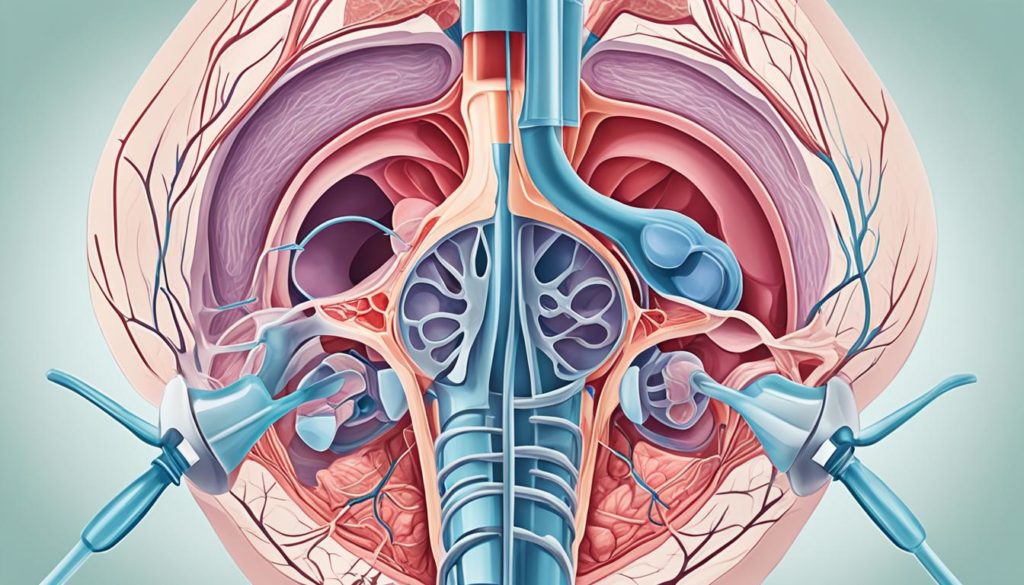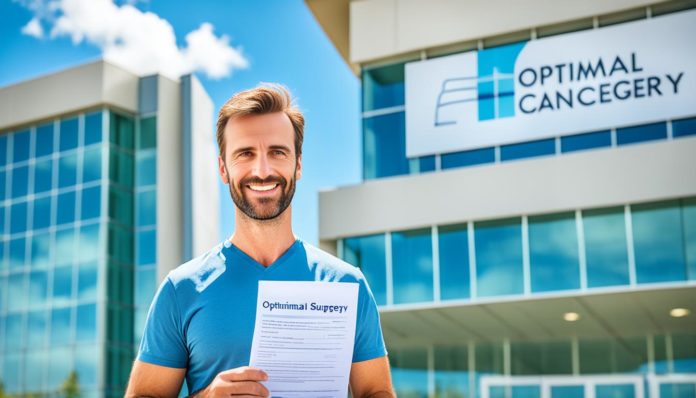Did you know preparing for prostate cancer surgery can boost recovery by up to 30%? This fact highlights how key it is to get ready before surgery. Taking steps in diet, nutrition, and setting up a home that’s easy to recover in matters a lot.
These actions are crucial for the best outcomes after prostate cancer surgery. As you get ready, these tips on pre-surgery prostate health will guide you. They aim to keep you safe and increase your chances of a good recovery.
Key Takeaways
- Pre-operative preparation can significantly enhance prostate surgery recovery.
- Diet and hydration adjustments are crucial for optimal outcomes.
- Organizing the home environment aids in smoother post-surgery recovery.
- Managing medications and supplements mitigates potential risks.
- A comprehensive approach to preparation can lead to better overall results.
Introduction to Prostate Cancer Surgery
It’s key to learn about radical prostatectomy if looking into prostate cancer surgery. This surgery is often suggested when cancer stays within the prostate gland. It might cure prostate cancer but has risks too.

Radical prostatectomy is a major surgery option. It removes the prostate gland and some nearby tissues. Learning all you can about Prostate Cancer Surgery Advice is critical for a wise choice.
This surgery can lead to incontinence and affect life quality. Knowing both good and bad possible outcomes is vital. Here’s a simple comparison to grasp radical prostatectomy in treating prostate cancer:
| Aspect | Details |
|---|---|
| Type | Radical Prostatectomy |
| Potential Benefits | Curing localized prostate cancer |
| Risks | Incontinence, impact on quality of life |
| Pre-Op Tips | Consult with your doctor, maintain good nutrition, and understand the surgery process |
With the right Prostate Cancer Pre-Op Tips and knowledge, patients can prep better for surgery. Talking thoroughly with healthcare providers about surgery benefits and risks is crucial.
Preparing Your Diet and Nutrition
Getting your diet right before prostate cancer surgery is vital. It helps with better surgery results and faster recovery. By eating certain foods, your body becomes stronger and ready for surgery.

Recommended Dietary Changes
Making smart food choices is key. Here are some Prostate Cancer Diet Recommendations to follow:
- Fill up on plant foods like fruits, veggies, whole grains, and beans.
- Choose lean meats such as chicken and fish.
- Add low-fat dairy to your meals.
- Cut down on processed foods and eat less red meat.
These food changes before surgery can boost your body. They also lower the chance of prostate cancer coming back. It’s a good idea to work with a nutritionist to customize these Prostate Cancer Diet Recommendations for you.
Hydration Tips
Being well-hydrated is crucial for Post-Surgery Nutrition and prep. Follow these tips to stay hydrated:
- Drink water, broths, and some fruit juices.
- Steer clear of sugary and caffeinated drinks before surgery.
- Stop drinking liquids when your doctor says to, for a safe surgery.
These hydration steps are important for your Prostate Cancer Pre-Op Tips. They help make your surgery and recovery smoother.
Managing Medications and Supplements
Effective Medication Management is key if you’re preparing for prostate cancer surgery. Following pre-surgery tips reduces risks and helps achieve the best surgical results. It’s important to know which medicines and supplements to skip before the surgery. By taking the right steps, you make things easier for everyone involved:
- Talk to your doctors about all your current medicines, especially if you take blood thinners or medicines for diabetes.
- Stay away from pain relievers like NSAIDs and aspirin, which can lead to more bleeding.
- Be careful with herbal supplements and vitamins, as some can make surgery more complicated.
Here’s a quick look at some common medicines and supplements. We’ll show you which ones to manage carefully or avoid:
| Type | Examples | Recommendation |
|---|---|---|
| Pain Medications | NSAIDs, Aspirin | Avoid |
| Herbal Supplements | Ginkgo Biloba, St. John’s Wort | Avoid |
| Blood Thinners | Warfarin, Heparin | Consult with Healthcare Provider |
| Vitamins | Vitamin E, Fish Oil | Avoid |
By sticking to these Pre-Surgery Prostate Cancer Tips on Medication Management and knowing which Supplements to Avoid Before Surgery, recovery can be smoother. Always keep talking to your healthcare team. This ensures that all medicines and supplements are handled right.
Home Preparation for Post-Surgery Recovery
When you’re preparing for prostate cancer surgery, setting up your home right is key. A well-prepared space leads to a smoother recovery and lowers the chance of problems.
Setting Up a Safe Environment
It’s important to make your home safe for when you get back from surgery. Start by getting rid of things you could trip over, like loose rugs and wires. Move furniture to clear paths and put things you use a lot in easy spots. This reduces stress and helps you heal without accidents.
Essential Recovery Aids
Some items can really help with your recovery after surgery. Think about getting these:
- Catheter buckets
- Toilet seat cushions
- Loose undergarments
- Stool softeners
- Disposable bed pads
- Recommended ointments
These products help with common issues after surgery. Having them ready as you’re preparing for prostate cancer surgery can really help. It can make your recovery easier to manage.
Importance of Physical Fitness
Getting fit is key when getting ready for prostate cancer surgery. It helps you recover better afterward. Using Prostate Cancer Pre-Op Tips can greatly change your surgery results. It can also boost the quality of your life once the surgery is done.
Doing Pelvic Floor Exercises (Kegels) is a good idea. They make your pelvic muscles stronger. This can lead to better bladder control after surgery. You can do these exercises every day. They are very beneficial.
“Kegel exercises involve the repeated contraction and relaxation of the muscles that form part of the pelvic floor. These exercises can be performed anywhere and anytime, making them convenient for anyone preparing for prostate surgery.”
It’s important to follow the exercise guidelines from the government. They suggest doing aerobic exercises regularly. Activities like biking, swimming, or walking keep you fit. A great way to prepare for surgery is to start walking. Try to walk for 30 minutes at a moderate pace on most days.
| Activity | Frequency | Benefits |
|---|---|---|
| Kegel Exercises | Daily | Improves urinary control |
| Walking | 5 times a week | Enhances cardiovascular health |
| Swimming | 3 times a week | Full-body workout with low impact |
| Cycling | 2-3 times a week | Strengthens leg muscles |
Following these Prostate Cancer Pre-Op Tips is crucial. Exercising before surgery can help with your recovery. Make sure to keep fit for the best results from your prostate surgery.
Pre-Admission Testing and Medical Clearance
To get ready for Prostate Cancer Surgery Preparation, assessing the patient’s health is key. This often means doing a series of Pre-Op Testing. These tests help us understand if someone is fit for surgery.
Required Tests
Patients need to take certain tests before the surgery. These essential tests usually are:
- Blood Tests
- Urine Analysis
- Radiologic Exams
- Electrocardiograms (EKGs)
Medical Clearance
Getting Medical Clearance for Surgery from a doctor is very important. This clearance means the patient can handle the surgery. It looks at the patient’s health, current conditions, and surgery risks. This makes sure the patient is ready for prostate cancer surgery.
Bowel Preparation
Bowel preparation is vital for safe and successful prostate surgery. It cleanses the intestines and cuts infection risk. To get ready, follow certain steps and guidelines closely. This careful process means paying attention and following doctors’ advice.
To start, you’ll drink magnesium citrate the day before your surgery. This laxative cleans out your intestines well. Then, you should have an enema to empty your bowels completely. These steps help remove any germs that could cause problems during surgery. They are key for cleaning and disinfecting.
Keeping hydrated is also key. Drink clear liquids all day to clean your system and keep body fluids balanced. It’s very important to help reduce infection risk.
You should also watch what you eat. Stop eating solid foods and drinking colored liquids by midnight before surgery. This makes sure your digestive system is empty, which helps avoid complications.
Here are the main steps to follow:
| Step | Description |
|---|---|
| Magnesium Citrate | Consume a bottle of magnesium citrate to cleanse the intestines. |
| Enema | Administer an enema the day before surgery. |
| Hydration | Stay hydrated with clear liquids throughout the day. |
| Discontinue Food and Drink | Stop all food and drink by midnight before surgery. |
By following these Pre-Surgery Prostate Health Tips, you prepare your bowel well. This makes surgery smoother and lowers infection risk. Always check with your doctor for advice that fits your health needs.
Pre-Surgery Prostate Cancer Tips
Getting ready for prostate cancer surgery includes important steps. One key step is avoiding alcohol and smoking. These can mess with your anesthesia and other medicines, causing problems during and after surgery.
If you have sleep apnea, bring your CPAP machine on surgery day. It helps keep your breathing steady while you’re under. This leads to better recovery and less risk after the operation.
Thinking about sperm banking is smart for men wanting kids post-prostatectomy. This step can keep your fertility options open since prostate surgery can affect your ability to father children.
To be fully prepared for your prostate surgery, it’s crucial to stick to all pre-op advice. This includes diet adjustments, getting ready your bowel, and stopping specific medications as detailed in the pre-surgery guidelines.
| Tip | Details |
|---|---|
| Abstain from Alcohol and Smoking | Interferes with anesthesia; avoid for better surgery outcomes. |
| Bring CPAP Device | For individuals with sleep apnea to ensure stable breathing. |
| Consider Sperm Banking | Preserve fertility options post-surgery. |
| Follow Pre-Op Recommendations | Includes dietary changes, bowel prep, ceasing certain medications. |
By carefully following these tips, you’re setting yourself up for a smoother surgery and recovery. Sticking to these prostate cancer treatment prep steps will greatly improve your surgery readiness.
Advice for the Day of Surgery
On the Day of Prostate Cancer Surgery, be fully ready for a smooth day. It’s essential to follow specific instructions on what to bring and wear. This also includes guidelines on activities and what to eat.
Personal Items to Bring
For Preparing for Surgery Day, gather necessary items like:
- Glasses
- Dentures
- Medications in labeled containers
Wearing comfy clothes and underwear is important. But, leave metal like jewelry at home. They’re not allowed in surgery areas.
Activity and Diet
Stay a bit active before the surgery. It helps keep your mind and body positive. Following your doctor’s diet advice is key too:
- Don’t eat or drink as your healthcare provider says.
- Opt for light meals and skip the heavy, fatty foods before your operation.
Doing these things will help make your Day of Prostate Cancer Surgery go well.
Conclusion
Getting ready for prostate cancer surgery means taking several key steps. Each one hugely helps in making surgery outcomes better. From eating right to staying physically fit, every effort helps make the surgery smoother and recovery faster.
It’s also vital to manage your meds and supplements well, as they affect your surgery and healing. Making your home recovery-friendly is another important step. It helps you heal better and more comfortably after the surgery.
Don’t forget about pre-admission tests and getting medical clearance, as they are essential. They make sure you’re ready for surgery. Preparing your bowels and planning for surgery day also help avoid any problems. By following these detailed tips and talking closely with your medical team, you can improve your surgery experience. And you can have a healthier life after surgery.
FAQ
What dietary changes are recommended before prostate cancer surgery?
Eat more plant-based foods, lean proteins, and low-fat dairy. Stay away from processed foods and red meats. Drink plenty of clear liquids before your surgery.
How should I manage my medications and supplements before prostate surgery?
Stop taking NSAIDs, aspirin, and herbal supplements that can increase bleeding risk. Talk with your healthcare provider about managing prescribed medications, like blood thinners and diabetes treatments.
What are the key steps to prepare my home for post-surgery recovery?
Make sure your home is safe and free of clutter that could cause falls. Stock up on healing aids. These include catheter supplies, soft toilet seats, and loose clothing. Add in stool softeners, bed pads, and recommended creams to help you heal.
Why is physical fitness important before prostate cancer surgery?
Be fit to help your body bounce back faster, especially with urinary function. Do pelvic floor exercises and aerobic activities. A regular walking routine gets your body ready and aids your recovery afterward.
What pre-admission tests are necessary before prostate cancer surgery?
Tests before surgery include blood work, urine tests, X-rays, and heart checks. They prepare you for safe surgery under anesthesia. You’ll also need a go-ahead from your primary care doctor.
How should I prepare my bowel before my prostate cancer surgery?
Drink magnesium citrate and take an enema the day before surgery. Also, drink only clear liquids. Stop eating and drinking by midnight to lower infection risks.
What tips can help me get ready for prostate cancer surgery?
Stop drinking alcohol and smoking to avoid surgery complications. Bring your CPAP machine if you have sleep apnea. Consider storing sperm if you want kids after surgery.
What should I do on the day of my prostate cancer surgery?
Bring things like glasses, dentures, and medication in labeled containers. Wear comfy, loose clothes without metal. Stick to dietary rules and keep moving as much as you can before the operation.


